There was no time to asses or skirt (take the bad stuff and poopy stuff off) when the shearing was done. Lots of help is required for that, not necessarily experienced or skilled, but quick and willing. There were only a few extra hands, just enough to get through the shearing, but not to pick the wool. After the rains, it was finally nice enough and there was time enough to do something with the wool.
First the fleece was laid out on a grid to take a look at it closely. All but one of the Babydoll fleeces were too conatminated with hay and other vegetative matter to be of any use whatsoever, so they were discarded. That was sad. It costs money to raise the sheep and to shear the sheep and the little wool offers helps recoup a bit of the costs. Throwing wool out is throwing money out. The Babydolls are small sheep and the larger sheep tend to pull hay over their backs. It then works it way in and composts a little, making it stick tight in the wool. Babydoll is heavy grease wool too, which means it has a good lanolin content, but the grease holds dirt and debris very much so. Maybe the t shirt idea on the Babydolls is not so bad after all. I will have to revisit that thought.
After the fleece is laid out and the poopy bits removed, it is shaken like a blanket to loosen and remove small fine bits. The wind is very helpful because it blows the fine bits and dust away as the fleece is shaken. The small second cuts, which result when the shearer has not cut close enough to the skin and goes over the sheep a second time, also blow away. Second cuts contaminate a good fleece and are to be avoided. The wool had a lot of second cuts this year for some reason. I think most were pretty well shaken and blown out.
Once the fleece is skirted and shaken, then it is inspected for problems. In some sheep the centre line and neck line is also contaminated with too much hay and must be removed. Then the relatively clean fleece is again assessed as to whether or not it will be kept whole or divided into parts. The Karakul fleeces were kept whole for now, except Sharon's, which was so lovely, I parted it to include in the wool sampler packs I intend to offer spinners and weavers. The samplers will include various rare wools in small amounts. This will allow the artists to work with wool they are not familiar with and select it next year when it is offered by the pound or ounce.
Several of the fleeces and parts of the large fleeces were put in laundry baskets and submerged in cold water in the livestock trough. This water will warm by the heat of the sun and create a fermentation of the organic matter in the water. It cleans the wool grease from the wool naturally, but does not remove hay or straw. The suint bath takes up to three weeks, depending on the temperature of the water. The trough is in the sun and is covered with windows to keep the heat in and the bugs out. After the suint fermentation the wool will be rinsed in many water changes until it comes out clear and then returned to the grids to air dry in the sunshine. Although the suint stinks unbelievable so, the wool, once completely dry, has no suint odor at all. Further washing is optional at that point but detergents woud no longer be necessary to remove any grease and grime.
The remainder of the fleeces will be packed into large paper lawn bags, labeled and put in the wool shed until they are ready to offer for sale. The sample packs will be about a half pound of many of the fleeces put in vacuum sealed bags. I have a great vacuum cleaner and am going to try to seal the ziplock extra heavy freezer bags after removing all the air. Vacuum sealer units are pricey and if that works then it will save money.
Next year the sheep will eat from hay nets. Supposedly they stay much cleaner. I am still thinking of putting t shirts on several of them. They have magnificent wool but it is always too contaminated to use. The t shirts might just keep them clean enough.
I did about half the fleeces yesterday and will complete the rest shortly. It is another beautiful day, not too too hot, with a little breeze, not as nice a wind as yesterday, but better than still air. When all is done, the area will be cleaned up with the pitch fork into the wheel barrow. The Angora goats need to be shorn again in late September. I plan to do that myself. The rest of the flock hopefully will be shorn much earlier than this year, hopefully in April or even March, though it is still quite cold here then. They just tend to hide out in the shelters staying close to one another and sharing their body heat until a layer of wool grows out again.
I do not truly enjoy the cleaning of the fleeces, but I love the clean wool. When I entered this business, I just had the idea I would ship the fleece to the mill, but the mills are a year behind their production. Selling raw fleece is the next best thing. I also have tried to process completely some of the wool myself, to sell it clean and in batts or picked and ready to card. That is extremely time consuming and almost thankless. For the amount of money wool sells for, and the time it takes, it definitely is not a lucrative occupation! And I did not love doing it. That is not say I never will, but to do the fleeces for sale would take hundreds of hours. That is not going to happen.
So outside I go to finish the job! Want to come?

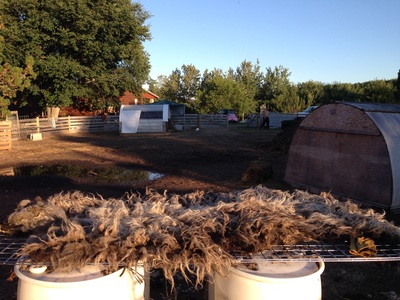
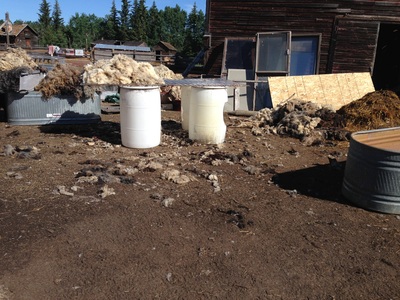
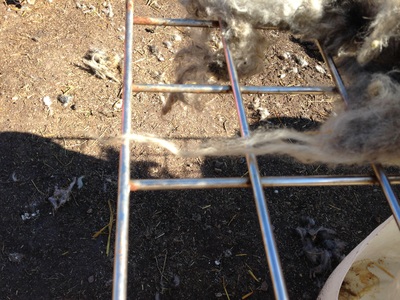
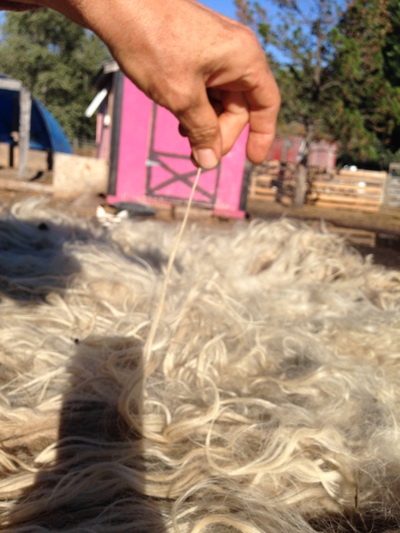
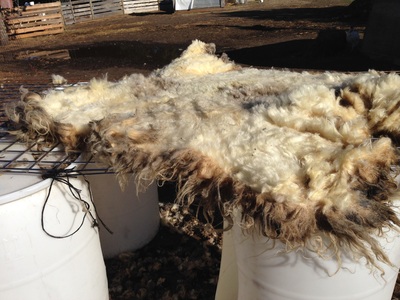
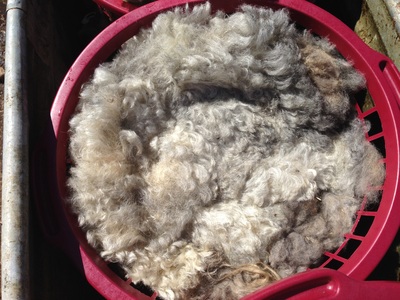
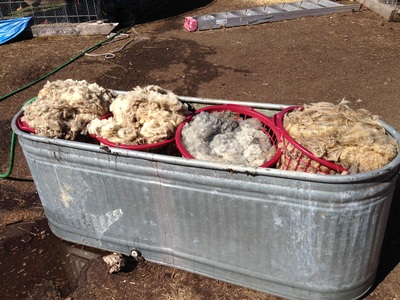
 RSS Feed
RSS Feed